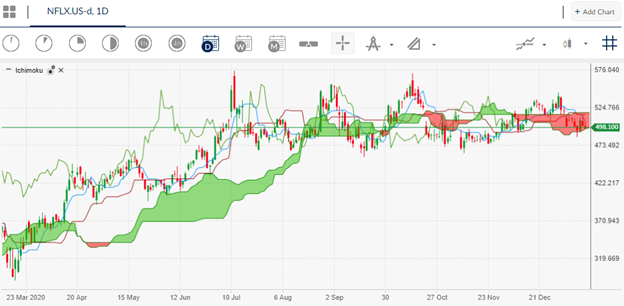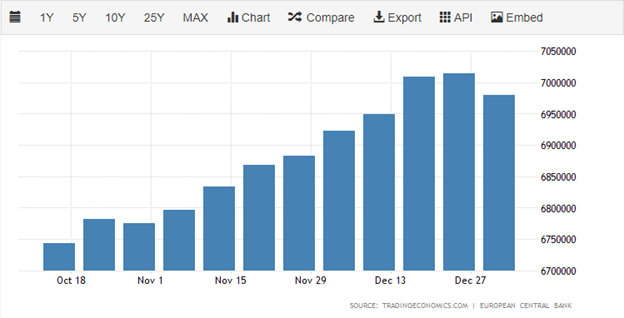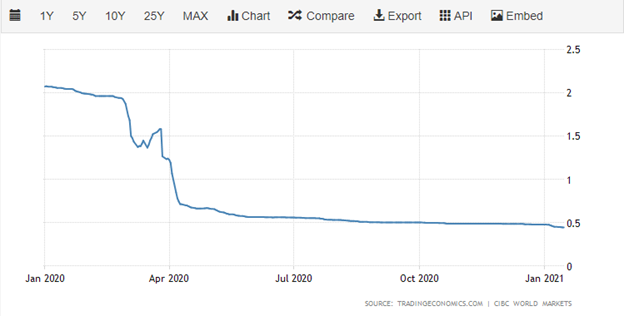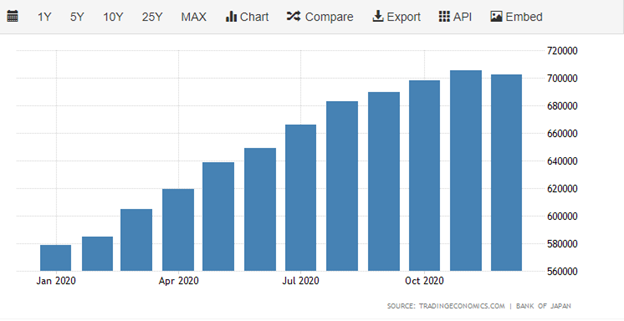Markets Look To Central Bank Decisions For Direction
Please login to join discussion
During the upcoming week traders and investors will be heavily focus on global central banks as the European Central Bank, Bank of Japan, People’s Bank of China, and Bank of Canada deliver interest rate and decisions.
Aside from the central bank action, other important events on the economic calendar include US earnings seasons, preliminary EU PMI manufacturing, preliminary US PMI manufacturing, and CPI data from the United Kingdom economy.
Banks are once again under the microscope during US earning season, with Goldman Sachs, Morgan Stanley and Bank of America taking center stage in early week trade. Markets participants will also look to fourth-quarter earnings from Netflix, INTEL, and IBM.


The US and EU PMI manufacturing reports are going to take on greater importance, due to the fact that both economies are starting to weaken as COVID-19 dampen manufacturing activity.
German and French PMI data will also be watched extremely closely, as both economies manufacturing sectors are the engine of growth for much of Europe at the moment. A headline reading under 50 could sink the euro currency and EU stocks.
European Central Bank
Markets are not pricing in any chance that the ECB will be adjusting rates during this week meeting, however they will be looking for updates on the new policy measures the central bank recently introduced and the situation with EU inflation.
ECB policy members have also started to comment of the strength of the euro currency, which leaves plenty of room for ECB President Christine Lagarde to comment on the single currency during the press conference.


The ongoing rise in the Italian bonds is also likely to be a hot topic, and the ECB President may be faced with a host of questions about the Italian economy, and Italian debt.
Bank of Canada
The Bank of Canada interest rate decision is likely to be extremely interesting as many analysts are predicting that the central bank will deliver a “micro interest rate cut”. The theory is the that central bank will deliver rate cuts in small increments, due to the worsening activity in the Canadian economy.


Rising COVID-19 infections and a negative December monthly jobs numbers are all reasons why the Bank of Canada could come out with dovish commentary, and a potential rate cut. Watch out for the trading action in the USDCAD, as the Canadian dollar could tank if the BoC follow through.
Bank of Japan
The Bank of Japan are most than likely going to follow the chorus of other central banks across the world, and express concerns about rising COVID-19 infections, and the possibility of another downturn for the Japanese economy.


BoJ members are likely to reaffirm their commitment to ultra-loose monetary policy and offer a downbeat assessment of the Japanese economy as the country goes into lockdown.
Watch out for action in the Japanese yen and the Japanese bond market if the central bank discusses upping bond purchases.
© 2020 YouTrading UK - Leaders in Trader Training.
| Cookie | Duration | Description |
|---|---|---|
| __cfduid | 1 month | The cookie is used by cdn services like CloudFare to identify individual clients behind a shared IP address and apply security settings on a per-client basis. It does not correspond to any user ID in the web application and does not store any personally identifiable information. |
| _wpfuuid | 11 years | This cookie is used by the WPForms WordPress plugin. The cookie is used to allows the paid version of the plugin to connect entries by the same user and is used for some additional features like the Form Abandonment addon. |
| cf_use_ob | This cookie is set by the provider Cloudflare content delivery network. This cookie is used for determining whether it should continue serving "Always Online" until the cookie expires. | |
| cookielawinfo-checbox-analytics | 11 months | This cookie is set by GDPR Cookie Consent plugin. The cookie is used to store the user consent for the cookies in the category "Analytics". |
| cookielawinfo-checbox-functional | 11 months | The cookie is set by GDPR cookie consent to record the user consent for the cookies in the category "Functional". |
| cookielawinfo-checbox-others | 11 months | This cookie is set by GDPR Cookie Consent plugin. The cookie is used to store the user consent for the cookies in the category "Other. |
| cookielawinfo-checkbox-advertisement | 1 year | The cookie is set by GDPR cookie consent to record the user consent for the cookies in the category "Advertisement". |
| cookielawinfo-checkbox-necessary | 11 months | This cookie is set by GDPR Cookie Consent plugin. The cookies is used to store the user consent for the cookies in the category "Necessary". |
| cookielawinfo-checkbox-performance | 11 months | This cookie is set by GDPR Cookie Consent plugin. The cookie is used to store the user consent for the cookies in the category "Performance". |
| viewed_cookie_policy | 11 months | The cookie is set by the GDPR Cookie Consent plugin and is used to store whether or not user has consented to the use of cookies. It does not store any personal data. |
| Cookie | Duration | Description |
|---|---|---|
| YSC | session | This cookies is set by Youtube and is used to track the views of embedded videos. |
| Cookie | Duration | Description |
|---|---|---|
| _ga | 2 years | This cookie is installed by Google Analytics. The cookie is used to calculate visitor, session, campaign data and keep track of site usage for the site's analytics report. The cookies store information anonymously and assign a randomly generated number to identify unique visitors. |
| _gid | 1 day | This cookie is installed by Google Analytics. The cookie is used to store information of how visitors use a website and helps in creating an analytics report of how the website is doing. The data collected including the number visitors, the source where they have come from, and the pages visted in an anonymous form. |
| Cookie | Duration | Description |
|---|---|---|
| _fbp | 3 months | This cookie is set by Facebook to deliver advertisement when they are on Facebook or a digital platform powered by Facebook advertising after visiting this website. |
| fr | 3 months | The cookie is set by Facebook to show relevant advertisments to the users and measure and improve the advertisements. The cookie also tracks the behavior of the user across the web on sites that have Facebook pixel or Facebook social plugin. |
| IDE | 1 year 24 days | Used by Google DoubleClick and stores information about how the user uses the website and any other advertisement before visiting the website. This is used to present users with ads that are relevant to them according to the user profile. |
| test_cookie | 15 minutes | This cookie is set by doubleclick.net. The purpose of the cookie is to determine if the user's browser supports cookies. |
| VISITOR_INFO1_LIVE | 5 months 27 days | This cookie is set by Youtube. Used to track the information of the embedded YouTube videos on a website. |
| Cookie | Duration | Description |
|---|---|---|
| _gat_UA-42160853-2 | 1 minute | No description |
| cf_ob_info | No description | |
| CONSENT | 16 years 8 months 3 days 6 hours 2 minutes | No description |